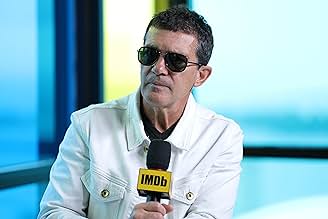IMDb रेटिंग
7.5/10
66 हज़ार
आपकी रेटिंग
एक फ़िल्म निर्देशक उन विकल्पों को याद करता है जो उसने अपने अतीत में किये थे, और कैसे उसका प्रभाव उसके वर्तमान पर पड़ता है, यह इस कहानी में दर्शाया गया है.एक फ़िल्म निर्देशक उन विकल्पों को याद करता है जो उसने अपने अतीत में किये थे, और कैसे उसका प्रभाव उसके वर्तमान पर पड़ता है, यह इस कहानी में दर्शाया गया है.एक फ़िल्म निर्देशक उन विकल्पों को याद करता है जो उसने अपने अतीत में किये थे, और कैसे उसका प्रभाव उसके वर्तमान पर पड़ता है, यह इस कहानी में दर्शाया गया है.
- 2 ऑस्कर के लिए नामांकित
- 71 जीत और कुल 178 नामांकन
फ़ीचर्ड समीक्षाएं
The story about the artistic crisis and depression. Once the noise of the glory goes away, there's nothing but emptiness and pain inside.
Almodóvar has created this autobiographical masterpiece during his darkest and the most lonely moments in his life. It's different from everything that the genius had shared with the world before.
Feeling of loneliness and pain in every scene, that makes a glory so unimportant and empty, when you have no one to share it with. The director made the audience hold the breath while he was speaking and sharing his most intimate secrets, his memories and regrets about the past.
Endless respect for Almodóvar for making this autobiographical movie so personal and sincere.
Endless respect for Almodóvar for making this autobiographical movie so personal and sincere.
A filmmaker (Antonio Banderas) deals with physical and mental ailments as he approaches old age, settling in to a sad kind of torpor as he reflects on life. People have come and gone and the real pain here seems to be quiet melancholy of regret, his body's (significant) issues notwithstanding. The film meanders a bit and suffers at times with pacing, but through his reflections and flashbacks, it tells a touching story about coming to peace with those we've known in life.
There's the filmmaker's mother (Penélope Cruz), who sent him to a seminary for most of his schooling because she had no money for a secular education, which led to him not learning much. In old age she dies alone in a hospital instead of in her home village, where he had promised to take her. (Oddly, the actor playing the elderly mother, Julieta Serrano, has blue eyes whereas Cruz's are brown, which was a little jarring to me). These are the things that swirl around in his mind as he still grieves over losing her.
There is also the actor from one of his popular films (Asier Etxeandia), who he had a falling out with decades ago, but who he reconnects with and is then introduced to heroin by. He casually tries it and then alarmingly we see him quickly hooked, which makes for what seemed like one of the longer subplots, which I wasn't all that interested in. There is an old lover who surfaces (Leonardo Sbaraglia), a man who disappeared out of his life and is now married with children, and the scene the two share is full of authenticity and warmth. He also recalls a time in childhood when he tutored a handyman for payment of services to his mother, and felt the first flush of desire when he saw him bathing.
I think Almodóvar was wise to draw a line at this last character not physically meeting him decades later, as it gave the film realism and a wistful bit of sentimentality. True to form, he also gives the viewer an explosion of primary colors, and there is certainly a lot of beauty on the screen. That kitchen, especially with its bold red cabinets, made me wonder if such a space would be too loud to live in, but later I read that it was modeled on Almodóvar's own home. I also loved the little touch of the Cruz's character and her friends breaking in to a light song while washing their clothes in the river. Nothing "big" happens here, but in its quiet way, it reflects the director, and his pain and glory in life.
There's the filmmaker's mother (Penélope Cruz), who sent him to a seminary for most of his schooling because she had no money for a secular education, which led to him not learning much. In old age she dies alone in a hospital instead of in her home village, where he had promised to take her. (Oddly, the actor playing the elderly mother, Julieta Serrano, has blue eyes whereas Cruz's are brown, which was a little jarring to me). These are the things that swirl around in his mind as he still grieves over losing her.
There is also the actor from one of his popular films (Asier Etxeandia), who he had a falling out with decades ago, but who he reconnects with and is then introduced to heroin by. He casually tries it and then alarmingly we see him quickly hooked, which makes for what seemed like one of the longer subplots, which I wasn't all that interested in. There is an old lover who surfaces (Leonardo Sbaraglia), a man who disappeared out of his life and is now married with children, and the scene the two share is full of authenticity and warmth. He also recalls a time in childhood when he tutored a handyman for payment of services to his mother, and felt the first flush of desire when he saw him bathing.
I think Almodóvar was wise to draw a line at this last character not physically meeting him decades later, as it gave the film realism and a wistful bit of sentimentality. True to form, he also gives the viewer an explosion of primary colors, and there is certainly a lot of beauty on the screen. That kitchen, especially with its bold red cabinets, made me wonder if such a space would be too loud to live in, but later I read that it was modeled on Almodóvar's own home. I also loved the little touch of the Cruz's character and her friends breaking in to a light song while washing their clothes in the river. Nothing "big" happens here, but in its quiet way, it reflects the director, and his pain and glory in life.
Less bombastic than some of his previous work (which I also love, by the way), this bittersweet film shows the maturity of a director that's been around and seen it all, someone who's experienced both pain and glory and is asking himself what's next in life. In this partly autobiographical narrative, his most personal so far, Almodovar expresses some frustration with aging and with loneliness, but also his appreciation for the path that he's had the privilege to make for himself and continues to work on, and the people who are important to him. He succeeds in exploring nostalgia without succumbing to sappiness. If anything, Almodovar's senses and craft are sharper than ever. He's able to be critical and loving at the same time. I like how has evolved through the decades and that he keeps experimenting with different styles of storytelling.
Antonio Banderas' award-worthy performance as the director's alter ego is understated, yet bold. Almodovar said in an interview that the choice was obvious, as Banderas is to him what Marcello Mastroianni was to Federico Fellini. And indeed there are some similarities between this film and '8 1/2': both films deal with the creative process. But whereas Fellini approaches the topic as a gladiator confronting obstacles with whip in hand, Almodovar is more low key and seems to point to tenderness as his weapon of choice.
It is a slow film, similar to life. I really enjoyed this movie, no one is clear what it is about until about and hour in. In simple terms is is film director who had lost his mojo because of the death of his mother and a back operations. He also begins to look back on his career and pivotal moments in his childhood. The flashback shots are perfectly and wonderfully capture the atmosphere of his young life while seamlessly interwoven with moments of present day.
Pain and glory is painful and glorious, as you'd except from a director who lives, suffers, enjoys and jogs his memory to find the small and grand moments of his human existence.
The acting of everyone was brilliant but limited so no Oscar here, Almodovar and Banderas are such a good match, the boy and the painter is such a delicate combination & the mother and the son in different moments of their lives, but mainly in the end, when they are both old. the dialogues are very meaningful, but movie as a whole had some profundity and was ravishingly shot as usual.
Pain and glory is painful and glorious, as you'd except from a director who lives, suffers, enjoys and jogs his memory to find the small and grand moments of his human existence.
The acting of everyone was brilliant but limited so no Oscar here, Almodovar and Banderas are such a good match, the boy and the painter is such a delicate combination & the mother and the son in different moments of their lives, but mainly in the end, when they are both old. the dialogues are very meaningful, but movie as a whole had some profundity and was ravishingly shot as usual.
As Salvador (exquisitely played by Antonio Banderas) says in the movie "A great actor is not the one who cries, but the one who knows how to contain the tears" and I think that describes the movie perfectly, you feel the pain in every scene but never get the chance to let that emotion overcome, it's a beautiful and raw portrayal of life in a way we've never seen Almodóvar do before, the film breathes a diaphanous simplicity and spontaneity, far from what we're used to see from the filmmaker. Every aspect of this movie felt very personal and intimate, almost like reading someone's diary while it's being written or someone sharing a part of their soul, i'm sure this movie wasn't easy to make.
This is a story about pain, sadness, solitude, self discovery, forgiveness and regret but most of all, it's a movie about overcoming and I honestly feel this is one of his best works in recent years.
This is a story about pain, sadness, solitude, self discovery, forgiveness and regret but most of all, it's a movie about overcoming and I honestly feel this is one of his best works in recent years.
क्या आपको पता है
- ट्रिवियाJulieta Serrano and Antonio Banderas already played mother and son, more than 30 years before, in another two movies by Pedro Almodóvar: Mujeres al borde de un ataque de "nervios" (1988) and Matador (1986)
- गूफ़The eye color of Penelope Cruz (Antonio's young mother) are brown while the old mother's are pale blue. In the very last scene of the film, it appears that Penelope Cruz is an actress who plays Antonio Banderas's young mother while filming a scene in front of him.
- भाव
Salvador Mallo: The nights that coincide several pains, those nights I believe in God and I pray to him. The days when I only suffer a type of pain I'm an atheist.
- कनेक्शनFeatured in 2020 Golden Globe Awards (2020)
- साउंडट्रैकA tu vera
Written by Juan Solano (as Juan Solano Pedrero) and Rafael de León (as Rafael de Leon Arias de Saavedra)
Performed by Rosalía and Penélope Cruz
टॉप पसंद
रेटिंग देने के लिए साइन-इन करें और वैयक्तिकृत सुझावों के लिए वॉचलिस्ट करें
- How long is Pain and Glory?Alexa द्वारा संचालित
विवरण
- रिलीज़ की तारीख़
- कंट्री ऑफ़ ओरिजिन
- आधिकारिक साइटें
- भाषा
- इस रूप में भी जाना जाता है
- Đau Đớn Và Vinh Quang
- फ़िल्माने की जगहें
- Paterna, Valencia, Comunidad Valenciana, स्पेन(underground dwelling)
- उत्पादन कंपनियां
- IMDbPro पर और कंपनी क्रेडिट देखें
बॉक्स ऑफ़िस
- US और कनाडा में सकल
- $45,67,338
- US और कनाडा में पहले सप्ताह में कुल कमाई
- $1,52,636
- 6 अक्टू॰ 2019
- दुनिया भर में सकल
- $3,73,59,689
- चलने की अवधि1 घंटा 53 मिनट
- रंग
- ध्वनि मिश्रण
- पक्ष अनुपात
- 1.85 : 1
इस पेज में योगदान दें
किसी बदलाव का सुझाव दें या अनुपलब्ध कॉन्टेंट जोड़ें


![Tráiler 2 [OV]](https://m.media-amazon.com/images/M/MV5BYWViMTBkNDgtOGM3Yi00YmFhLTk2OTItYWY5ZDJlODg0NGY4XkEyXkFqcGdeQXRyYW5zY29kZS13b3JrZmxvdw@@._V1_QL75_UX500_CR0)
![Tráiler [OV]](https://m.media-amazon.com/images/M/MV5BOGQ1YmRmNjUtMjVmYy00NDAxLThhNmEtMGNjNTIzZmQ2ZTcxXkEyXkFqcGdeQXRyYW5zY29kZS13b3JrZmxvdw@@._V1_QL75_UX500_CR0)





































